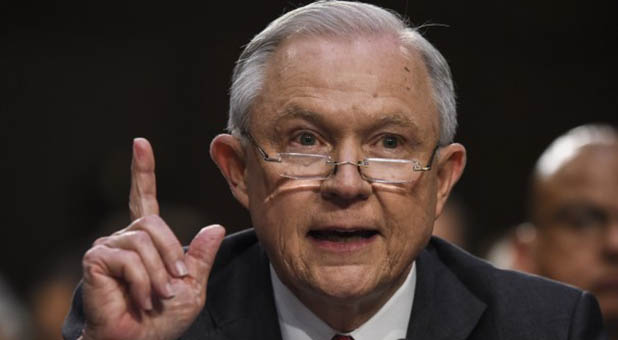Democrats Played Dumb About Executive Privilege
Yesterday, when Attorney General Jeff Sessions eloquently defended himself and President Trump before the Senate Intelligence Committee, one of the key points of contention was whether he could or should disclose the content of private conversations he had with the president.
In response to several questions about his private conversations with the president, Sessions told Democrats that he could not answer because longstanding Justice Department policy prevented him from disclosing advice privately rendered to the president, but that only the president could invoke executive privilege to shield that from public disclosure.
Democrats seemed completely baffled by this and kept asking Sessions the same questions over and over, only to be met with Sessions’ polite refusal to answer.
Indeed, New Mexico’s Democratic Senator Martin Heinrich scurrilously accused the attorney general of “obstructing a congressional investigation.”
Heinrich became irritated when Sessions said it “would not be appropriate” to discuss private conversations between himself and Trump.
Sessions said that while he doesn’t have the right to claim executive privilege and not respond to such questions, Trump does.
“Because you’re invoking executive privilege,” Heinrich said. He reminded Sessions that he swore an oath to “tell the whole truth.”
“And now, you’re not answering questions. You’re impeding this investigation,” Heinrich said.
Sessions said that Justice Department’s rules allow him to decide what may or may not be appropriate to discuss publicly.
“I’m protecting the president’s constitutional right by not giving it away before he has a chance to [do so],” Sessions said.
“You are obstructing [a] Congressional investigation,” Heinrich said.
Setting aside the fact that Democrats vigorously defended Obama’s Attorney General Eric Holder when he invoked similar policies and eventually was cited for contempt of Congress, they know very well how executive privilege works and why the Supreme Court has generally allowed the president and executive branch to withhold from Congress deliberative documents, drafts and privately rendered advice, especially legal advice.
In layman’s terms, when there are two parties to a conversation, the privileged party, in this case the president, owns the conversation. The other party cannot disclose it without his permission.
And logically, the president can’t decide whether he wants to disclose the contents of the advice until a question about it is asked, thus requiring the witness, in this case Sessions, to avoid answering the question until the President decides whether to answer.
Or not.
To advance their narrative that the president has something to hide in the Russia investigation, the media and Democrats would like the public to believe that executive privilege is some general choice the president makes in advance of a hearing or question, but that is not how it works.
And they know it.
Why, because as the head of the executive branch, the president, or more usually his designee in the Office of Management and Budget, White House Counsel or Department of Justice, clears every communication between the executive branch and Congress.
When cabinet or sub-cabinet appointees testify before Congress, their written testimony is cleared with the White House.
When Congress writes a letter to a cabinet official asking for information, that reply is cleared before it goes to the Hill.
Getting the president’s permission to disclose information is routine—and Heinrich and the other grandstanding Democrats on the Senate Intelligence Committee know it.
The concept of executive privilege was first established by President George Washington, and the courts have regularly upheld the president’s authority to shield certain documents and advice rendered by aides and cabinet members from congressional scrutiny.
Yesterday, Democrats were playing dumb to gain a political advantage, and Attorney General Sessions shot them down in the clearest and most polite terms possible. {eoa}















































